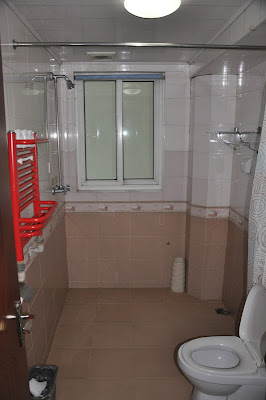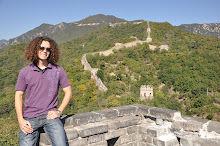The drive from Yantai airport to the town of Penglai took an
hour and it was mostly on highways with little traffic. We couldn’t see too
much of the landscape due to the fog/haze. We could make out a mountain in the
distance and a few wind farms. It was mainly rural with lots of farmland,
mostly apple orchards.
Even though there was minor traffic, we were quickly
re-acquainted with the no rules driving of Asian drivers. They rarely stayed in
their lane (I mean, why stay in one lane when I can just take up two?). They
had no problems passing one another via the shoulder or across the centerline
(you know the solid one that indicates NO passing allowed in the opposite lane).
The speed limit was completely ignored. And if you thought the purpose of a
horn was to warn your fellow drivers of imminent danger, you thought wrong. No, as a rule of thumb the horn is used when the driver is inconvenienced or the driver is in the process of inconveniencing others. If someone slows down in front of you for any reason, you honk your horn. If someone indicates to turn and
they happen to be in front of you, you honk your horn as you pass them. If you are in the
opposite lane of traffic trying to pass a slower vehicle and another car is
coming head-on towards you, you honk your horn to tell them to get the heck out
of your way. Although we had experienced such antics before (from our 3 years
in Thailand and various travels across the continent), living in Australia with
its strict driving rules had spoiled us. I’ll be sure to dedicate an entire
blog post on the crazy driving habits in China.
 |
| Our apartment building viewed from the main street |
Alive and in one piece, we finally arrived in the town of Penglai. Penglai is a town and subdivision of the city of Yantai. The city of Yantai contain 6.5 million people while the town of Penglai has about 20,000. Penglai is one of China's oldest military ports, built in 1376 under the Ming dynasty. It is known as a local tourist destination due to the beaches, the new wine-growing region, and the government supported attractions (rebuilt temples, palaces, and other historical sites). It is widely known for its seaside mirages in the spring - a reflection of the city can sometimes be seen over the ocean due to rare atmospheric conditions.
We turned off the main road down some back-alley and were dropped off at the Wanghailou Hotel. The 20-story building looked old, plain, and in need of a face-lift – but then again all the buildings we’d seen so far during our drive fit this description. We entered the small, unlit lobby and were greeted by the receptionist, a young woman who spoke excellent English. She took us to the dimly lit hallway where the elevators were located. It smelled of urine. And dead fish. Nice. We took the elevator to the 17th floor and the receptionist told us that we could choose between 2 rooms. We really didn’t know what to expect upon entering the first room, but we were optimistic as it was the apartment where all of the expats on Amber’s project were living. We certainly weren’t prepared for what we saw next.
 |
| The entrance to our apartment building |
When we entered the room we stepped into a very large living room that had a lovely 3-piece sofa set taken straight for the 1980’s. There was also a small 5-piece dining table, a glass-topped coffee table, a small entertainment center with a bulky 1990s TV sitting on top, all laid out in a weird, not very functional, arrangement.
 |
| The living room and balcony |
The walls were off-white in color, dirty, and chunks of it were missing in some areas. We looked into each of the 4 bedrooms and each had a nightstand, TV stand with bulky TV, and a double bed or two single beds. In 3 of the rooms the bed took up 80% of the bedroom leaving very little room to even walk, let alone store things.
 |
| Bedroom with hole in the wall |
One of the rooms had a hole in the wall, as if it were punched. The 4th bedroom was bigger than the rest, presumably the master bedroom, but, oddly, it had two single beds instead of a double bed. All of the wallpaper seams could be seen or were peeling, and behind the TV the wallpaper was black with what looked to be water stains.
 |
| Peeling wallpaper in the master bedroom |
 |
| Stained wallpaper and/or no wall behind the wallpaper |
The apartment room contained two separate quite large, glass-enclosed
balconies with decent views of the city and the ocean. Unfortunately, we
couldn’t see the ocean that was literally 3 blocks away because the smog was so
thick.
The two bathrooms each had a shower, cracked toilet, and
sink. The old fixtures and open plumbing of the sinks were very
unattractive to say the least. Curiously, the shower in the 2nd bathroom contained a washing machine. We later realized that we couldn't move the washing machine and use it elsewhere because the connections for it (the water tap and drain) were constructed in the shower.
 |
| The lovely bathroom plumbing |
 |
| A nice 'open' layout (no shower door or floor divider) |
 |
| The washing machine sitting in the shower of the 2nd bathroom |
The kitchen was fairly small and contained a proper 2-burner
gas stove top, a small 2-bowl sink, a dish rack with dishes, and a combination
rice-cooker and steamer. Noticeably missing were a refrigerator, oven, and
microwave.
 |
| At least we were provided with quintessential Asian cookware - a wok and a butcher's knife |
 |
| The other side of the kitchen included drawers, cabinets, a wall heater, the water heater, and the gas meter. |
As we made our way through the apartment I noticed that Amber was brewing inside, like a teapot. Reliving my days as a real estate agent, I did my best to comment on the few positive features, and downplay the negative qualities of the room. The receptionist seemed very proud of the room, re-iterating the size of the space, the number of bedrooms, and the great view. We left the room and went across the hall to inspect the other room. It was quite similar in design and features. The main difference was that the living room had a better layout, there were only 3 bedrooms, and it only had 1 balcony, which wasn’t facing the ocean. Amber opted for the apartment with the better layout, but I opted for the one with more space as I knew we would need it to hold all of our belongings. The receptionist was quit puzzled that we were even considering taking the smaller room, but seemed pleased when we decided on the larger apartment. She handed us our room keys and left us to unpack.
It was then that we were struck with the reality that living in China wouldn’t be another amazing notch to add to our expat exploits. I was happy and relieved that we had finally made it to China. After 4 months of processing and paperwork and unknowns, plus extended hotel living leading up to the big relocation, we could finally get back to a normal living situation and begin to acclimate ourselves to a new culture. Amber, on the other hand, was unimpressed with the drive to Penglai, she was unimpressed with what she saw of Penglai so far, and she was completely disgusted at the ‘dump’ that would be ‘home sweet home’ for the foreseeable future. Or, as we have affectionately come to call our dismal surroundings, “home stanky home”, courtesy of the declaration that Amber’s coworker announces as they approach the apartment's parking lot every single day.
After unpacking a little, decompressing, and coming to grips with reality, we decided that a couple things had to get done by the end of the day – get our cell phones working and buy some sort of mattress support to make the rock-hard bed sleepable. We re-assured each other that everything was going to be okay (mostly me comforting Amber). And then we made our way to the streets of Penglai.
After unpacking a little, decompressing, and coming to grips with reality, we decided that a couple things had to get done by the end of the day – get our cell phones working and buy some sort of mattress support to make the rock-hard bed sleepable. We re-assured each other that everything was going to be okay (mostly me comforting Amber). And then we made our way to the streets of Penglai.



